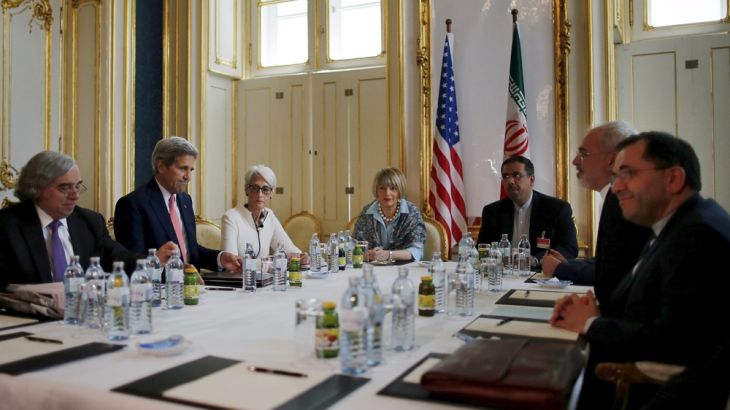Iran nuclear talks resume days before deal deadline
US Secretary of State Kerry and Iranian Foreign Minister Zarif say “hard work” is needed to reach agreement by June 30.

Top US and Iranian officials have said hard work was still needed as they met in Austria for what could be their final negotiations to bridge significant differences on an agreement to curb Iran’s nuclear programme.
With a self-imposed deadline approaching on Tuesday, both sides emphasised that major obstacles remained to finalising a deal under which Iran would cut back its nuclear programme in exchange for relief from economic sanctions.
Keep reading
list of 4 itemsUS House approves aid package worth billions for Ukraine, Israel
Will India’s election be free and fair?
Togo approves constitutional reform changing how president is elected
“We have a lot of hard work to do. We have some very tough issues,” US Secretary of State John Kerry said on Saturday, according to a US state department draft transcript.
The top American diplomat arrived earlier in the Austrian capital Vienna, using crutches, after falling off his bike earlier this month.
Q&A: Iran nuclear negotiations
He was followed by Iran’s foreign minister, Mohammad Javad Zarif, who also said that much work needs to be done, “in order to be able to make progress and move forward”.
Kerry and Zarif’s first meeting ended after 90 minutes, and has resumed at approximately 13:00 GMT, according to Al Jazeera’s James Bays, who is reporting from Vienna.
Our correspondent said that there are still “substantial” issues that the parties need to discuss, including details on inspections and sanctions.
In a statement to reporters following the first meeting, Zarif said Iran will continue to insist that “all of the sanctions, economic and financial sanctions, need to be removed immediately”.
Arriving for the afternoon meeting on Saturday, French Foreign Minister Laurent Fabius said negotiators need to fulfil three conditions to reach a deal, including rigorous inspections, long-lasting limits to nuclear research and development and a mechanism to quickly reimpose sanctions if there are violations to the deal.
Weapons fears
The main differences are on the pace and timing of sanctions relief for Iran in return for its steps to restrain its nuclear programme, and on the nature of monitoring mechanisms to ensure Tehran does not cheat on any agreement.
|
|
The US, Israel and some Western nations fear that Iran has been trying to develop a nuclear weapons capability but Iran says its programme is for peaceful purposes only.
In addition to Iran and the US, the talks include Britain, China, France, Germany, and Russia.
Foreign ministers from all the nations, as well as the European Union foreign policy chief, are expected in Vienna in the coming days.
In November, the seven nations involved in the talks set a late March deadline for a framework agreement, which they ultimately reached on April 2, and a June 30 deadline for a comprehensive deal.
The real deadline is not June 30 but July 9, diplomats say.
The US delegation must present the deal to Congress by July 9 if a mandatory congressional review period is to be limited to 30 days before President Barack Obama can begin suspending sanctions. After July 9, the review will last 60 days, according to a law passed recently by US legislators.
Negotiators involved in the talks fear that such a lengthy delay, which would also hold up the cancellation of United Nations nuclear-related sanctions by the UN Security Council, would be too long and would create the opportunity for any deal agreed in Vienna to unravel.